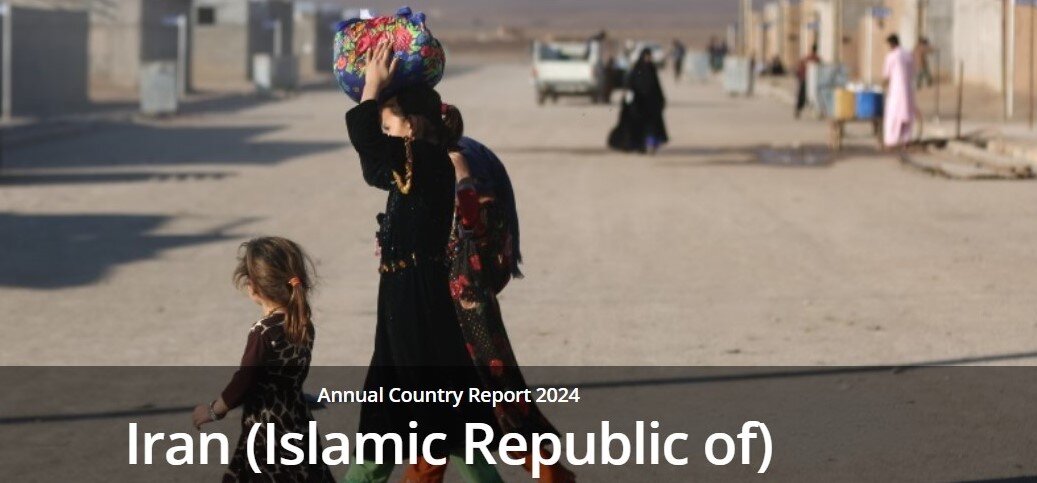INSUBCONTINENT EXCLUSIVE:
TEHRAN - The World Food Program (WFP) has released its 2024 report on Iran based on the Interim Country Strategic Plan (ICSP 2023-2027).In
2024, WFP provided a combination of in-kind and cash assistance to address the food needs of over 33,000 vulnerable refugees in Iran
As a result, 70 percent of them were able to consume food at an acceptable level, a figure that remains nearly stable compared to the
previous year.Since August, WFP successfully increased the value of the cash transfer entitlement by 25 percent, actively helping to
mitigate the immediate economic challenges reported by refugees.WFP has maintained a presence in Iran since 1987, primarily focused on
addressing the food security needs of refugees mainly from Afghanistan
Iran has hosted refugees for over four decades
Most refugees, along with those in refugee-like conditions, reside in urban, peri-urban, and rural areas, often integrated with host
However, the most vulnerable refugees living in 20 settlements across 13 provinces, face a precarious food security situation that
necessitates continued humanitarian assistance by WFP.WFP provided food assistance, educational support, and livelihood opportunities
through in-kind food distributions, unconditional cash transfers, and capacity-strengthening initiatives to eligible refugees who live in
settlements.Given the economic situation in Iran in recent years, Afghan refugees have also faced many challenges, including reduced income
opportunities and diminished purchasing power, which have impacted their food security and well-being, particularly among those in
In response, WFP adjusted its Interim Country Strategic Plan (ICSP 2023-2027) to align with the need by modifying cash entitlements and food
rations, adjusting the number of beneficiaries, and extending the duration of the ICSP by two years to align with the United Nations
its support to these refugees and address their increasing humanitarian needs
There are around 35,000 most vulnerable documented refugees who live in 20 settlements across 13 provinces in Iran and are benefitting from
33,000 beneficiaries on a monthly basis, with an average assistance duration of about 30 days
The Post Distribution Monitoring (PDM) reports indicate that 70 percent of beneficiaries were able to consume food at an acceptable level
and the increase of cash assistance which helped to some extent offset the loss of purchasing power.WFP Iran incorporated a cash top-up
This strategic initiative was piloted in February 2023 across two large settlements and began expanding to additional settlements in early
As of end of December, the initiative benefits 271 individuals including 158 men and 113 women.Under its school meals programme, WFP reached
approximately 8,700 refugee schoolchildren (51 percent girls) attending primary and junior high schools, alongside 650 Iranian teachers (30
Nutritious snacks - milk paired with either a date bar or a biscuit - were distributed daily during the academic year, aiming to enhance
feeding programme, the school feeding program has positive impacts on students' learning abilities as well as their physical health
programme.To promote girls' education and reduce barriers to attendance, approximately 2,850 girls at primary and junior high school levels
paying internet cost as reported by them during field monitoring visits.WFP supported income-generating activities tailored to refugees'
needs and requests, with a particular emphasis on empowering women and girls
Three new income-generating projects (bag-making workshop, beauty salon, and barbershop) were initiated in 2024 while people continued
benefiting from opportunities provided by WFP since 2019 to increase community resilience such as greenhouse, tailoring, bag making, suit
making, welding, mushroom cultivation, baking, and others.Sufficient funding in 2024 allowed WFP to generally carry out all activities
without notable interruption in assistance
Under the general food assistance programme through unconditional resource transfers, beneficiaries received assistance for an average of
Similarly, the average duration of assistance for the school meals programme was satisfactory only slightly lower than planned with an
actual duration of 175 days, out of the planned assistance 177 days.WFP did not respond to any emergencies for Iranians in 2024, as no
interventions efficiently.In 2024, WFP actively engaged in key interagency platforms, including the United Nations Country Team (UNCT), the
Regional Refugee Response Plan (RRP), and Interagency Working Groups focused on Cash, Livelihoods, Education, and Protection
Collaboration with partners such as the United Nations High Commissioner for Refugees (UNHCR), the Iranian Red Crescent Society (IRCS), and
international NGOs like Relief International (RI), the Norwegian Refugee Council (NRC), and Cooperazione e Sviluppo (CESVI) remained central
Highlights of these partnerships included joint Post-Distribution Monitoring with UNHCR and participation in diverse interagency initiatives

